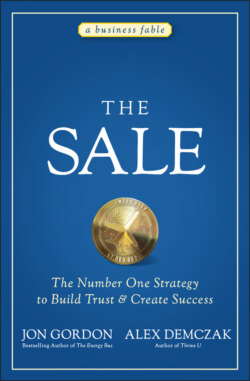Читать книгу The Sale - Джон Гордон, Dan Britton, Mark Batterson - Страница 11
Chapter 3 The Future of Turnbow Technologies
ОглавлениеNow in his early 80s, Jerry was regularly being told by his closest friends and advisors that he needed to start thinking about who would replace him as president and CEO when he was ready to retire. Jerry knew that the best thing for Turnbow was to have a succession plan in place, identifying a new CEO who could lead the company for years to come. The industry was evolving at a rapid pace, and cutting‐edge leadership was imperative. Jerry insisted that he would be patient in finding the right person.
Jerry had always hoped that someone in his family would succeed him in running the business. His only child, Bruce, had been a local TV news host for 21 years and had no desire to join the family business. That left his two grandchildren, Luke and Matt. Luke had made all the money he could ever want and loved his life of freedom. He didn't desire the corporate life and was happily raising his kids in Florida.
Matt was his only other option, but Matt was not ready to be a leader. Over the years, Jerry had heard many worrisome stories about him. He loved his grandson and wanted to make sure that he had a good job at Turnbow, but for the sake of the employees and the company at large, Jerry recognized that Matt was not prepared for a leadership role, especially not one as vitally important as CEO.
Jerry gathered his leadership team and formed a search committee for his successor. He was adamant that the search could take as long as necessary to find just the right person. First, the committee decided to review external candidates before considering internal candidates. Jerry wanted to help facilitate a smooth transition with the future CEO. He wanted to find the right leader with a fresh and vibrant energy and ideas to move the company forward.
Since the beginning, Jerry was the smiling face of the organization. It was his leadership that had propelled it to local, national, and even worldwide impact, with his insistence on great customer service, impeccable products, attention to detail, and integrity. He always focused on doing little things to make his employees and team members feel valued. He would regularly send handwritten, personal notes to employees to recognize them individually and thank them for their hard work. Jerry walked the aisles of the production plant to make sure that frontline workers were doing well, and he personally called clients to thank them for their business. Jerry seemed like a grandpa to all because of the love and care he showed them.
Despite how open and available Jerry was, he did keep some secrets. He was experiencing a health challenge but had decided not to tell anyone at Turnbow other than his board of advisors. Fourteen years earlier, he had been diagnosed with cancer. After multiple rounds of chemotherapy, it was eradicated. However, doctors recently told him that it had returned.
Despite this difficult news, Jerry's attitude and life perspective remained unchanged. In college, he played football and was a middle linebacker. Even though he was charming off the field, on the field he was a warrior, and he approached life with this same spirit. Jerry was determined that cancer shouldn't change the way that he loved, served, and cared for others every day, so he figured that everyone was better off not knowing and worrying about the state of his health. Even though he didn't talk about it openly with employees, people started to notice his physical decline. His trusted friends and family knew that someday he would no longer have the capacity to lead, no matter how difficult it was to imagine Turnbow without him.
